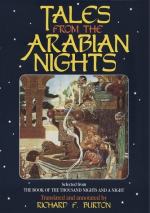[FN#240] Iblis, meaning the Despairer, is called in the Koran (chaps. xviii. 48) “One of the genii (Jinnis) who departed from the command of his Lord.” Mr. Rodwell (in loco) notes that the Satans and Jinnis represent in the Koran (ii. 32, etc.) the evil-principle and finds an admixture of the Semitic Satans and demons with the “Genii from the Persian (Babylonian ?) and Indian (Egyptian ?) mythologies.”
[FN#241] Of course she could not see his eyes when they were shut; nor is this mere Eastern inconsequence. The writer means, “had she seen them, they would have showed,” etc.
[FN#242] The eyes are supposed to grow darker under the influence of wine and sexual passion.
[FN#243] To keep off the evil eye.
[FN#244] Like Dahnash this is a fanciful P. N., fit only for a Jinni. As a rule the appellatives of Moslem “genii” end in us (oos), as Tarnus, Huliyanus, the Jewish in—nas, as Jattunas; those of the Tarsa (the “funkers” i.e. Christians) in—dus, as Sidus, and the Hindus in—tus, as Naktus (who entered the service of the Prophet Shays, or Seth, and was converted to the Faith). The King of the Genii is Malik Katshan who inhabits Mount Kaf; and to the west of him lives his son-in-law, Abd al-Rahman with 33,000 domestics: these names were given by the Apostle Mohammed. “Baktanus” is lord of three Moslem troops of the wandering Jinns, which number a total of twelve bands and extend from Sind to Europe. The Jinns, Divs, Peris ("fairies”) and other pre-Adamitic creatures were governed by seventy-two Sultans all known as Sulayman and the last I have said was Jan bin Jan. The angel Haris was sent from Heaven to chastise him, but in the pride of victory he also revolted with his followers the Jinns whilst the Peris held aloof. When he refused to bow down before Adam he and his chiefs were eternally imprisoned but the other Jinns are allowed to range over earth as a security for man’s obedience. The text gives the three orders. flyers. walkers and divers.
[FN#245] i.e. distracted (with love); the Lakab, or poetical name, of apparently a Spanish poet.
[FN#246] Nothing is more “anti-pathetic” to Easterns than lean hips and flat hinder-cheeks in women and they are right in insisting upon the characteristic difference of the male and female figure. Our modern sculptors and painters, whose study of the nude is usually most perfunctory, have often scandalised me by the lank and greyhound-like fining off of the frame, which thus becomes rather simian than human.
[FN#247] The small fine foot is a favourite with Easterns as well as Westerns. Ovid (A.A.) is not ashamed “ad teneros Oscula (not basia or suavia) ferre pedes.” Ariosto ends the august person in
Il
breve, asciutto, e ritondetto piece,
(The
short-sized, clean-cut, roundly-moulded foot).
And all the world over it is a sign of “blood,” i.e. the fine nervous temperament.




